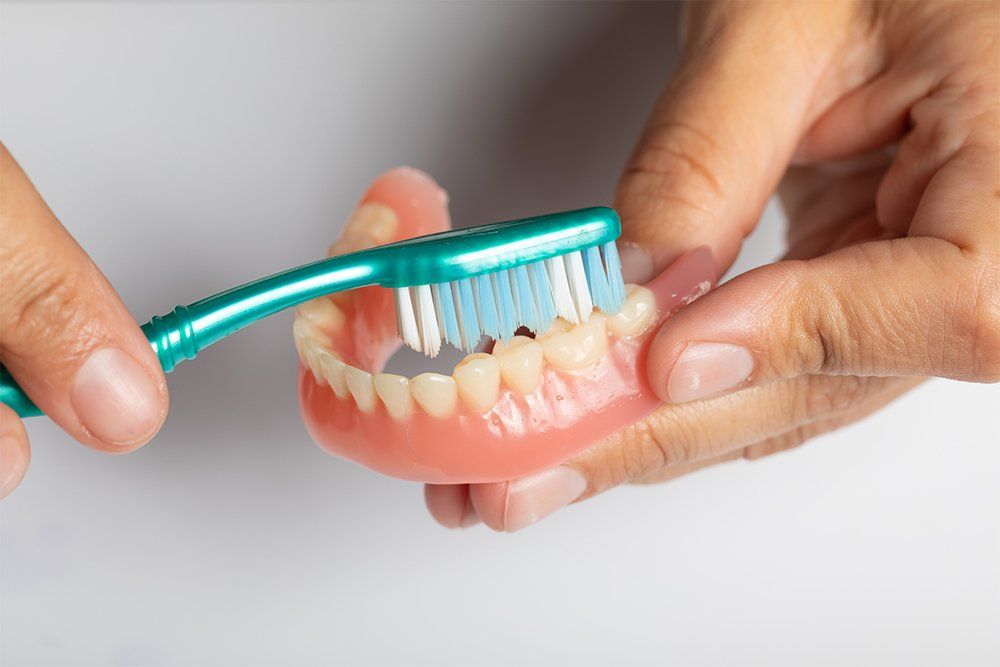Have some questions about getting dentures? We have put together some of our Frequently Asked Questions for you.
I need dentures. Where do I start?
A prosthetist focuses on the replacement of lost teeth, including dentures for even the most complex cases. A prosthetist also will be able to help determine if another treatment option might be more suited to your particular situation and can refer you to an appropriate provider.
What types of dentures are there?
Dentures may replace all or only some of the teeth. The dentures that replace all the teeth are known as complete dentures and they rest on the gums that cover the jawbones. The stability and retention of these dentures can be improved by attaching them to dental implants.
Dentures that replace some but not all of the teeth are known as partial dentures. They attach to the teeth that are still present and also cover and rest on the gums and bone where the teeth are missing. Dental implants can also be used to restore and stabilize partial dentures as well.
What is the average cost of dentures?
Denture fees vary widely based on many factors including the complexity of your particular treatment, the time required to accomplish the treatment, etc. The best way to determine fees for the services you require is to book an initial consultation with Emerald Denture Clinic and discuss the care you may need.
How do I care for my dentures?
Staining:
To minimize staining, properly clean your dentures daily to remove food and plaque bacteria. Brushing with a denture brush or soft toothbrush will prevent dentures from becoming permanently stained and keep your mouth healthy. Moisten the brush and apply a non-abrasive soap or denture paste (regular toothpaste is too abrasive).
Brush every surface, inside and out, scrubbing gently. A variety of over-the-counter denture cleanser products may be safely used (by following the manufacturer’s instructions) to remove most stains. More stubborn stains may require removal by your prosthetist.
Brushing:
Do not brush your dentures with normal toothpaste. Toothpastes are designed to be used on teeth, and they often contain materials and chemicals that help whiten and strengthen teeth but may harm dentures, which are made of very durable plastic.
Even though the plastic is strong, it is not as strong as the enamel of teeth and may be scratched by using toothpaste to clean your dentures. You should use a dishwashing liquid and a special denture brush to clean your dentures by hand every day. After rinsing them thoroughly, soak your dentures in a water-based cleaning solution overnight.
Repairing broken dentures:
The best solution is to return to the prosthetist who made your dentures and have the cracked denture repaired professionally. It may seem easy to fix, but it is important that the repair is done correctly to prevent problems with chewing and to avoid any sore spots.
The prosthetist also needs to check the denture and adjust it after it is repaired. The denture may be too old and may no longer fit closely to your gums, and you may need a new denture.
Can I sleep with my dentures on?
Yes, you can wear your dentures at night but it is preferred that they be removed. You should remove your dentures at night and this will give your gums and bone a chance to relax from the pressure of the denture during the day. If you need to wear your dentures for social reasons or to prevent your jaws from over closing, you should find time during the day to properly clean your mouth and your prostheses.
You should never wear your dentures 24 hours a day without performing proper oral hygiene. Dentures should be cleaned at night and stored in water during the night.
Can I eat normally with dentures?
Most patients need to learn how to use dentures properly and as a result, it takes a little time to get used to them. After a while, you should be able to eat fairly normally, but it may take more time to get comfortable with harder foods or sticky foods.
Using a small amount of denture adhesive (no more than three or four pea-sized dabs on each denture) may help stabilize the dentures and help hold them in place while you learn how to get comfortable with them and may make the learning process easier. Dentures and chewing gum do not usually work well together, ultimately, if you wear dentures, you should avoid chewing gum.
How much pain is involved with getting dentures?
When you’re first fitted for new dentures, it’s normal to experience minor irritation, which should fade as your mouth becomes accustomed to them. The period of pain varies. If you’ve previously worn dentures and now have a new set it may take longer.
Similarly, if you had some natural teeth present that were removed at the time of the new dentures, the areas where the extractions were performed may be painful or uncomfortable for up to several weeks after the removal of the teeth. Regular visits to your prosthetist to adjust the dentures as you go through the normal healing process are recommended.
How do you know when it’s time to reline dentures?
If the dentures no longer fit as well as they once did, you may need to have a procedure done to refit the base of the denture, called a “reline". Check with your prosthetist to see if your dentures can be relined. This procedure will enable your dentures to have a tighter, better fit.
What are permanent dentures?
The term “permanent dentures” is deceptive and misleading. As we know, most things in life are not permanent, teeth and dentures alike. “Permanent dentures” are retained by screws or dental cement onto dental implants and cannot be removed by a patient; they can only be removed by your dentist or prosthodontist.
Eventually even these “permanent dentures” may wear or break or become stained and discoloured and will require replacement. Typically, the soreness should be resolved within two weeks; if it persists, likely something in the denture needs to be adjusted. You should see your dentist or prosthodontist as soon as possible.

In today's fast-paced world, dental advancements have revolutionised the perception of dentures, making them a viable solution for individuals of all ages. This blog explores the benefits of considering dentures at a young age, dispels common myths, and delves into the modern techniques offered by Dingley Village Denture Clinic. Understanding Tooth Loss Causes in Youngsters Tooth loss among young individuals can stem from various factors, including gum disease cavities acid reflux or bulimia sports injuries Despite their youth, many individuals find themselves grappling with the physical and emotional repercussions of missing teeth. Benefits of Dentures or Partial Dentures Dentures or partial dentures offer a multitude of benefits beyond simply replacing missing teeth. From enhancing smile aesthetics to preventing teeth shifting and misalignment, these dental solutions play a crucial role in restoring confidence and social interactions. Why Opt for Dentures Early On? Contrary to popular belief, dentures are not exclusively reserved for the elderly. Modern advancements in dentistry have made dentures more comfortable, natural-looking, and accessible to individuals of all ages. With advanced technology, early adopters can enjoy the benefits of dentures without compromising on aesthetics or functionality. Dispelling Myths Surrounding Dentures One of the prevalent misconceptions surrounding dentures is that they are bulky, uncomfortable, and reserved for older generations. However, modern dentures are sleek, lightweight, and customised to suit each individual's unique needs. Partial dentures offer a conservative approach, preserving existing teeth while seamlessly replacing missing ones. The Denture Fitting Process: A Step-by-Step Guide At Dingley Village Denture Clinic, the journey to obtaining dentures begins with a comprehensive consultation. Our experienced denture specialists assess the patient's oral health, discuss treatment options, and formulate a personalised treatment plan. From initial impressions to final adjustments, every step is meticulously tailored to ensure optimal comfort and functionality. Exploring Innovative Denture Solutions In addition to traditional dentures, Dingley Village Denture Clinic offers advanced solutions such as implant-supported dentures. These cutting-edge prosthetics provide unparalleled stability and security, allowing patients to enjoy their favourite foods and activities without limitations. Consultation is Key: Partnering with Our Experts Choosing the right denture solution is a collaborative process between the patient and our experienced denture specialists. During the consultation, patients have the opportunity to ask questions, express concerns, and gain insights into the various treatment options available. Dingley Village Denture Clinic strives to empower patients with knowledge and confidence throughout their denture journey. As dental technology continues to evolve, the stigma surrounding dentures diminishes, paving the way for individuals of all ages to embrace these life-changing prosthetics. At Dingley Village Denture Clinic , we are committed to providing innovative denture solutions tailored to each patient's unique needs, ensuring they can smile confidently and live life to the fullest. Book an appointment now!

Is it possible to have dentures put in the same day as teeth removal? Yes, it is possible to have your teeth removed and dentures put in the same day. These dentures are called immediate dentures and you should talk to your prosthetist to see if that treatment is the best for you. I have implants under my bottom denture, but my denture is still loose. Why? If the implants had been placed a long time ago and you have not returned for follow-up/ maintenance visits, such problems can occur. Unfortunately, in time the bone shrinks beneath dentures causing the dentures to slip and slide resulting in painful ulcers. Additionally, the attachment parts get worn down with use or damaged and require replacement. Regular visits to your prosthetist is recommended. As a new denture wearer, the bottom denture seems loose. What should I do? In most cases, the lower denture is much less stable than the upper denture. This is due to the shape of the gums on the lower ridge and movement of the denture caused by the tongue. Ask your prosthetist about supporting your lower denture with dental implants. Implants can be used to stabilize and retain the lower denture allowing you to chew more efficiently and feel the confidence of knowing that your denture will stay in place. Is it possible to perfectly colour match my partial denture to my remaining natural teeth? Our Prosthetists is highly trained in the art of colour and shade matching. Assuming it is a new partial denture, we can work to produce a match to your remaining natural teeth. If it is an existing partial denture, we would recommend having a new one made, as the expense would be about the same to recolour the old one. What do I do if the screws in the denture are loosening? If you had implants inserted, it sounds like the implants were intended to help stabilize the denture, in which case, they should reduce the movement. If your dentures rub your cheeks or if you’re biting your cheeks, you should return to the dentist or prosthetist who made the dentures to continue to have the fit and bite refined. You should visit your dentist or prosthetist to remedy these difficulties. What do I do if my dentures feel very heavy and it is difficult to close my mouth? While it may take time to simply adjust to the new dentures, it is likely that if teeth were removed the same day that the dentures were given to you, then you will need to follow up with your prosthetist to assure that they continue to fit properly as you heal. If you did not have any teeth extracted and simply had new dentures made, there should be fewer adjustments. These adjustments should be more minor in nature. The heavy feeling may be because you have not previously worn dentures or partial dentures. If that is the case, it will take several weeks to completely adapt to the feel of them. After a very long time of denture wearing, I'm losing gum and bone. Can this be fixed? Research shows that once the teeth are removed, the jaw bone shrinks and changes shape. Typically, dentures should be checked every year, and often they should be remade when they lose their fit and are loose in your mouth after 5-10 years of use. By using dental adhesive, you may have masked the loose fit of your dentures. Even though you have adapted to these dentures, you are not receiving the function and appearance you deserve. Also, it is important that you take your dentures out at night to allow your gum tissues to rest and decrease the possibility of sore spots. My dentures will not stay in no matter what kind of adhesive I use. What should I do? Relines of dentures should improve the fit of the base of the denture to the jaw. However, if your jaw has been without natural teeth for some time, it may be difficult to make the denture stable if there is little jawbone. Soft tissues beneath dentures can also become easily irritated by wearing dentures continually (24 hours a day). You should refrain from wearing dentures at night as this gives the skin a chance to recover from wearing them during the day. Your dentist or prosthetist should make sure that the skin inside the mouth is healthy and take steps to treat it properly before relining. If there is enough jawbone available, relines can often be done well. If not, it may be necessary to revisit the need for either remaking or redesigning the denture. Is there a way to replace teeth with dentures after losing them from oral cancer? Call our friendly Prosthetist for a consultation. Some patients have to wait a period of time before dentures can be fitted to avoid these concerns. Details of the cancer treatment are important and may guide the timeline and treatment approach. Is it possible to get dentures after not having teeth for a long time? It’s hard to predict how much of the upper and lower jaw will remain after 20 years without teeth. When teeth are removed, often the bone that held them in slowly shrinks over time. This doesn’t happen to everyone, but it’s normal after tooth removal. It’s important that dentures are made properly to fit well and keep minimum stress on the bone. It’s not likely that you’ll have all the bone you started with after 20 years of not wearing a denture. Your dentist or prosthetist should annually examine your mouth to assure ideal oral health, including the bone level that would be below your dentures. The back of my dentures pop up when eating. What do I do? Your dentures may be ill-fitting or the position of the implants may not be the most favourable. Usually, this can be resolved by improving the fit of the denture or by adding (more) implants. Your prosthetist can help you with this situation. After applying adhesive, it's very difficult to remove dentures. How do I remove them without pain? If you are using your denture adhesive correctly, there should not be a lot of adhesive left on your gums and palate when you remove your denture. Patients use a variety of methods to remove the adhesive: a piece of gauze, a tissue, a damp washcloth, or a wet toothbrush. Use no more than three or four pea-sized dabs of adhesive on each denture. Can I claim anything back on my health insurance? It will depend on your health insurance provider and the level of cover you have. With most providers, it is only covered as an ‘Extra’ so the best thing to do is to ask for a quote from your dental prosthetist with the treatment plan and item numbers noted and call your health insurance provider. They will then be able to tell you based on the item numbers and type of treatment you require whether you are covered and if so for how much.

At Dingley/Emerald Denture Clinic our bespoke range of removable Partial Overdentures utilises proven techniques and materials available in modern dentistry. Our Bespoke range is: “Phonares II” German-made Composite denture teeth, which gives more durable wear and natural aesthetics. Recording of jaw relationship using Facebow transfer. Removable partial overdenture stabilisation with dental implants. You will immediately enjoy the benefits of dental implants on your overdenture: Enhanced retention and stability compared to your regular denture. Better aesthetics as visible clasping is reduced or eliminated altogether Better chewing function enabling you to eat foods that you could not eat before. Improved comfort and confidence. Less chance of denture sore spots and ulcerations on your gums as the dental implants inhibit the movement of the denture base toward the soft tissues when biting. Other important hidden long-term advantages to you are: Preservation of remaining residual ridge by better distribution of forces. Minimisation of damaging leverage to remaining teeth and therefore increasing the longevity and health of your natural teeth. Easy maintenance. Better affordability compared to fully fixed implant dental bridges. The dental implants most likely will be able to adapt to suit any future changes to your dental condition(s). What Is a Dental Implant? Dental implants are titanium fixtures shaped like a bolt placed surgically inside the jaw and with healing ‘Osseo-integrate’ with the surrounding bone. The threads of the dental implant osseo-integrate with the bone below the gums and a precision attachment connects to the dental implant above the gum line. Metal housings with rubber O rings are positioned within your removable overdenture, which then slips over the precision attachments much like a ‘press-stud’ mechanism. The number of implants used and their location intra-orally will be determined by: The quality and volume of your jaw bone present. Safety boundaries surrounding vital anatomical and neurovascular structures. Your personal clinical preference and budget. The condition and positions of remaining dentition. Important note: Your removable overdenture still rests on your gums. Dental implants provide a form of anchorage and retention. Your overdenture is still removable and is NOT permanently fixed to your jaw. Are dental implants suitable for you? There are no absolute health contra-indications for dental implants. However, osseo-integration is less predictable in diabetics and cigarette smokers. Dental Implants cannot be used in those who have taken IV bisphosphonates used to treat osteoporosis. Chronic use of corticosteroids for auto-immune disorders will lower the success rate of dental implants. Where to from here? Referral to Dentist A set of impressions will be taken to create primary models of your teeth and gums. Referral to a bulk billed imaging centre to acquire a simple 2-D x-ray (OPG). Exam and consultation to assess the condition of your dentition. Review of your medical and dental histories. Plan for any restorative dental treatment that the remaining natural teeth may require in preparation for your overdentures. Initial measurements and intra-oral exam will determine whether the volume of bone present in your jaw allows you to be a possible candidate for dental implants. If the 2-D x-ray looks promising, then a more detailed Cone Beam CT (CBCT) will be referred to scan your jaw three-dimensionally. The reason why we do not refer for a CBCT straight away is to avoid unnecessary cost. The CBCT allows us to check the volume and shape of jaw bone and visualisation of important anatomical structures, and to map the best location of the dental implants. We will show you the results of the CBCT and proposed location of the dental implants at a separate consultation appointment. Consent forms to be signed and witnessed. The consent forms will provide more details on the pros and cons of dental implants and possible complications. Prior to implant surgery, we will make a decision whether a new temporary denture will be made or your existing denture can be modified for you to wear during the implant healing phase. The first surgery involves placing the implants in your jawbone. During the first surgery, an incision is made in the gum where the implant will be placed. A hole is drilled in the bone, the implant is placed in the hole and the incision is stitched closed. After this surgery, we wait for 3-4 months under normal circumstances for the dental implants to osseo-integrate before scheduling for the second surgery. Your interim denture may need some minor adjustments or soft reline while you are healing. 11. Once the implants have successfully osseo-ontegrate, the second surgery can be organised. This second surgery is simpler than the first. A small incision is made in your gum to expose the tops (heads) of the implants. A healing cap is placed on the head of each of the implants exposed in order to guide the gum tissue to heal correctly. Your interim denture will need to be modified to accommodate for the healing caps. 12. About 2 weeks after the second surgery, the healing caps are replaced with the chosen precision attachments. Your gums should now be healed well enough for an impression on which your new Bespoke overdenture is to be fabricated. Again, your interim denture will need to be adjusted or be unsuitable to wear. 13. The fabrication of your new Bespoke overdenture should take approximately one month. Caring for your Bespoke Overdenture: You will need to remove the overdenture at night and for cleaning. You should carefully clean around the precision attachments above your gums. Gum disease (peri-implantitis) can develop around the implants and will compromise their stability and ultimately lead to premature failure. Annual dental examination is necessary for us to check that your natural dentition, implants and attachments dentition are functioning as intended and the gums and bone remain healthy. The retention caps in the housings embedded within your denture will need replacement when they become worn or degraded. Generally speaking, replacement is required every 2- 4 years. Additional fees will apply. Renew the composite teeth and reline the denture base using an existing casting base every 8 to 10 years depending on the amount of jaw bone shrinkage which occurs with aging. Additional fees will apply. If you'd like to know more please contact us .

And let’s not forget Christmas breakfast’s, lunches and dinners or the massive spread that’s put on for New Year celebrations! So your dentures will get a workout, and if you have a new set, it’s understandable if you’re a little nervous. So we have listed a few tips on how to adjust to life with new dentures, so you are able to enjoy this festive season. Slow and steady wins the race With your new-found freedom, you could be excited to eat your favourite foods again. Eating with dentures is different from eating with your natural teeth, so taking it slow and steady at the start will help you as you adjust to life with your new dentures. Cutting your food into smaller pieces or into thin strips will make it easier to chew Use both sides of your mouth to chew Eat softer foods like scrambled eggs, smoothies, fully cooked pasta, cooked vegetables, fish and soups to begin with as you get used to your dentures. Take care when biting, and use both sides Avoid biting at the front of your teeth as this could lead to your dentures being dislodged. Using both sides of your mouth to chew will help your gums get used to the gentle pressure. Once you get more confident eating with your dentures, you’ll be able to eat tougher foods like red meat and hard fruit. TIP: if you need to bite down, use your canines aka eye teeth. The long term view Eating with your dentures will become a comfortable experience and eventually, you will be able to eat a very similar diet to the one you had before. Make sure you do take the time to prepare your food correctly especially if they are hard or sticky by nature. Denture care And like all things, if you take great care of your dentures they should last you a long time. Here are some quick tips on caring for your dentures: Brush dentures daily: using a soft-bristled brush and hand soap Soak dentures daily: using a denture cleaning solution May be necessary to leave your dentures out overnight Visit your dentist or prosthetist regularly: to make sure your denture fits correctly For further information visit: https://www.ada.org.au/Your-Dental-Health/Older-Adults-65/Dentures With these tips and tricks, you’ll be able to enjoy your new smile and life with dentures. For more information on dentures or to book an appointment contact Dingley Village Denture Clinic on 03 9552 5521, Emerald Denture Clinic on 03 5968 2626 or email via tibballsdental@gmail.com

It's now mouthguard season and here at Emerald & Dingley Village Denture Clinics we offer a range of colours and patterns to suit your needs. From your favourite football club colours to a single solid colour we can do it all. For all kinds of sports and recreation activities, for all age groups mouthguards play an important role in your safety and the safety of your teeth & gums. Mouthguards generally cover the upper teeth and protect the soft tissues of your tongue, lips and cheek lining. They help cushion impact to the face, reducing the risk of broken, chipped or knocked out teeth and possible injuries to your lips, tongue, face or jaw. A mouthguard will also help redistribute forces from a blow to the head. While a mouthguard won't prevent a concussion, it can reduce the severity of the injury. Here at Emerald & Dingley Village Denture Clinics we custom fit your mouthguard to be one of a kind to allow for braces or plates by individually fitting the moulds to you in person onsite in the clinic. For more information or to book your appointment please contact Warwick Tibballs on 03 5968 2626 - Emerald or 03 9552 5521 - Dingley Village https://www.dingleyemeralddentures.com.au/contact Emerald Denture Clinic 396 Belgrave-Gembrook Road, Emerald VIC 3782 Ph: 03 5968 2626 Dingley Village Denture Clinic 134 Centre Dandenong Road, Dingley VIC 3172 Ph: 03 9552 5521

Here at Dingley Village Denture Clinic and Emerald Denture Clinic, we pride our selves on providing easy to follow tips for the care of your dentures. Check out below for some easy tips to follow for clean dentures. STEP 1: BRUSH YOUR DENTURES EACH DAY Use a non-abrasive cleaner, e.g. a denture toothpaste, to clean and remove plaque. STEP 2: SOAK, RINSE, DRY Use a denture cleanser to sanitise your dentures. Remove after recommended time, then rinse and dry. STEP 3: LEAVE YOUR DENTURES OUT AT NIGHT Prevents infection and helps to relive any soreness. STEP 4: REGULARLY VISIT YOUR DENTAL PROSTHETIST Regular check-ups ensure your mouth and dentures remain healthy. For more tips or to book your check up, contact us today!

Do you have difficulties eating with your full lower denture? Do you get embarrassed sometimes when your lower denture flops out when you are talking? Do you find food constantly getting stuck under your lower denture? Do you lose control of your loose lower denture? Do you frequently get ulceration in your mouth where the lower denture sits? Do you constantly find your lower denture impinging on your gums despite numerous adjustments by your dental prosthetist? If you are experiencing any of the above and are looking for ways to improve on your situation; Mini Dental Implants (MDIs). What are MDIs? We presume that you have heard of dental implants replace missing teeth. Simplistically, dental implants are placed surgically inside the jaw and with healing ‘Osseo-integrate’ with the surrounding bone. A ‘false’ tooth is then attached to the implant. With MDIs, the principle is the same; the only difference is the ‘mini’ signifies that they are smaller in size than conventional dental implants. So if a conventional dental implant is like a ‘bolt’; then a MDI is like a ‘tack’. How do MDIs benefit to you? MDIs can be used effectively to provide stabilisation to your loose lower full denture. As you can see in the diagram, four MDIs are placed in the front part of the lower jaw. They are arranged like four footy goal posts. The threads of the MDIs osseo-integrate with the bone below the gums and the ball components of the MDIs protrude above the gum line. Metal housings with rubber O rings are positioned within your lower denture, which then slips over the metal balls of the MDIs, much like a ‘press-stud’ mechanism. Are MDIs suitable for you? It all depends on whether you have adequate bone volume in your lower jaw to accept the MDIs. There are no absolute health contra-indications for MDIs. However, osseo-integration is less predictable in diabetics and cigarette smokers. MDIs cannot be used in those who have taken bisphosphonates used to treat osteoporosis. Chronic use of corticosteroids for auto-immune disorders will lower the success rate of MDIs. Now the Good news – Most of our clients with MDIs find major improvement in function and stability when chewing. They also report great comfort and confidence in their lower dentures. Studies have shown good longevity with MDIs.* (refer to clinical studies listed below) MDIs are cost effective, minimally invasive and time efficient. The surgery is done in our office with no need for off-site specialist referral. You will still be able to wear and use your dentures during the healing phase of the MDI treatment. (Certain precautions will need to be taken with respect to your diet and adjustments will need to be made to your dentures immediate post insertion of MDIs.) The MDIs work the best with well- fitting new upper and lower dentures. However, they can be retro-fitted to existing dentures as well. We will need to assess your existing dentures first to see if they will work properly with the anticipated locations of the MDIs. According to our guidelines, dentures need to be renewed every 8 years. The new dentures can be fabricated to accept existing MDIs. The MDIs commonly should not need to be replaced, unless advised otherwise. For more information, contact us . References: 1, Griffitts, T.M, Collins C.P., Collins, P.C. Mini dental implants: An adjunct for retention, stability and comfort for the edentulous patient. Oral Surgery, Oral medicine, Oral Pathology, Oral Radiology and Endodontology, 100 (5): E81 – E84, 2005. 2, Shatkin, T.E., Shatkin, S., Oppenheimer, B.D., Oppenheimer, A.J. Mini dental implants for long term fixed and removable prosthetics: A retrospective analysis of 2514 implants placed over a five-year period. Compendium, 28: 36-41, 2007 3, Elsyad, M.A., Gebreel, A.A., Fouad, M.M., Elshoukouki. The clinical and radiographic outcome of immediately loaded mini implants supporting a mandibular overdenture. A 3-year prospective study. J Oral Rehabil 2011; doii:10.111/j.1365-2842.2011.02213.x. 4, Todorovic, A., Markovic, A., Scepanovic, M. “Stability and peri-implant bone resorption of mini-implants as complete lower denture retainers”, poster contribution to the conference “Implantology for the compromised patient”, university of Medical Center Groningen, The Netherlands, Feb 1st-4th 2012.

Simplistically, dental implants are titanium fixtures shaped like a bolt placed surgically inside the jaw and with healing ‘Osseo-integrate’ with the surrounding bone. The threads of the dental implant osseo-integrate with the bone below the gums and a precision attachment connects to the dental implant above the gum line. Metal housings with rubber O rings are positioned within your removable overdenture, which then slips over the precision attachments much like a ‘press-stud’ mechanism. You will immediately enjoy the benefits of dental implants on your overdenture: Enhanced retention and stability compared to your regular denture. Better aesthetics as visible clasping is reduced or eliminated altogether Better chewing function enabling you to eat foods that you could not eat before. Improved comfort and confidence. Less chance of denture sore spots and ulcerations on your gums as the dental implants inhibit the movement of the denture base toward the soft tissues when biting. Other important hidden long-term advantages to you are: Preservation of remaining residual ridge by better distribution of forces. Minimisation of damaging leverage to remaining teeth and therefore increasing the longevity and health of your natural teeth. Easy maintenance. Better affordability compared to fully fixed implant dental bridges. The dental implants most likely will be able to adapt to suit any future changes to your dental condition(s) The number of implants used and their location intra-orally will be determined by: The quality and volume of your jaw bone present. Safety boundaries surrounding vital anatomical and neurovascular structures. Your personal clinical preference and budget. The condition and positions of remaining dentition. Are dental implants suitable for you? There are no absolute health contra-indications for dental implants. However, osseo-integration is less predictable in diabetics and cigarette smokers. Dental Implants cannot be used in those who have taken IV bisphosphonates used to treat osteoporosis. Chronic use of corticosteroids for auto-immune disorders will lower the success rate of dental implants. Caring for your Bespoke Overdenture: You will need to remove the overdenture at night and for cleaning. You should carefully clean around the precision attachments above your gums. Gum disease (peri-implantitis) can develop around the implants and will compromise their stability and ultimately lead to premature failure. Annual dental examination is necessary for us to check that your natural dentition, implants and attachments dentition are functioning as intended and the gums and bone remain healthy. The retention caps in the housings embedded within your denture will need replacement when they become worn or degraded. Generally speaking, replacement is required every 2- 4 years. Renew the composite teeth and reline the denture base using existing casting base every 8 to 10 years depending on the amount of jaw bone shrinkage which occurs with aging. If you'd like to know more please contact us .

